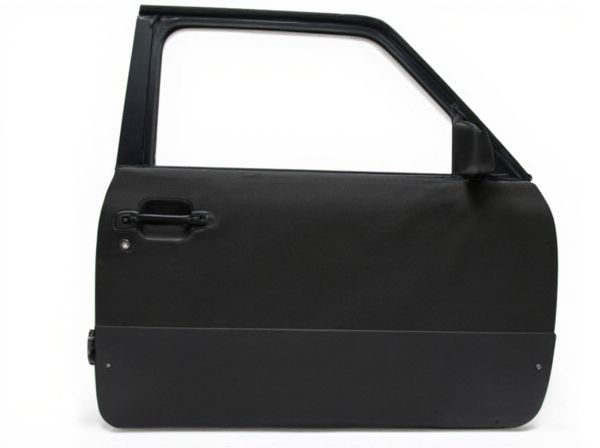
Photo illustration: Hardtop vs Soft-top Door
Hardtop doors provide superior durability and enhanced security, making them ideal for rough weather conditions and off-road adventures. Soft-top doors offer more flexibility and ease of removal, allowing for an open-air driving experience and quick customization of your vehicle. Choosing between the two depends on your preference for protection versus versatility.
Table of Comparison
| Feature | Hardtop Door | Soft-top Door |
|---|---|---|
| Material | Rigid metal or composite panel | Flexible fabric or vinyl |
| Durability | High resistance to impacts and weather | Less durable, prone to wear and tear |
| Security | Provides superior theft protection | Easier to breach due to soft material |
| Insulation | Better thermal and sound insulation | Poor insulation against noise and temperature |
| Weight | Heavier, may affect fuel efficiency | Lighter, improves vehicle agility |
| Maintenance | Low maintenance, durable finish | Requires regular cleaning and waterproofing |
| Cost | Higher initial cost | Lower initial cost |
Introduction to Hardtop and Soft-Top Doors
Hardtop doors are rigid, often metal or composite panels that provide enhanced security, insulation, and weather protection, commonly found on SUVs and trucks. Soft-top doors are made from flexible materials like vinyl or canvas, offering lightweight, removable options ideal for convertible cars and off-road vehicles. Both door types serve distinct purposes, balancing durability, ease of removal, and climate control depending on vehicle design and user preference.
Key Differences Between Hardtop and Soft-Top Doors
Hardtop doors offer superior durability and enhanced security due to their solid construction, making them ideal for long-term protection against weather elements. Soft-top doors provide greater flexibility and ease of removal, favored for off-road vehicles or convertible models where quick adaptability is essential. Key differences include material composition, insulation capability, and installation complexity, with hardtops excelling in rigidity and weatherproofing, while soft-tops prioritize lightweight convenience and versatility.
Durability: Hardtop vs Soft-Top Doors
Hardtop doors offer superior durability compared to soft-top doors due to their solid construction from materials like steel or aluminum, providing enhanced protection against environmental elements and impacts. Soft-top doors, often made from fabric or vinyl, are more susceptible to wear, tearing, and UV damage, requiring more frequent maintenance and replacement. The robust design of hardtop doors ensures longer lifespan and better security for vehicles in harsh conditions.
Weather Protection and Insulation
Hardtop doors offer superior weather protection and insulation due to their solid construction and durable materials, effectively blocking wind, rain, and noise. Soft-top doors, typically made from fabric or vinyl, provide less effective insulation and allow more sound and temperature variations to penetrate the vehicle interior. For climates with extreme temperatures or frequent precipitation, hardtop doors enhance comfort and maintain interior climate stability better than soft-top alternatives.
Security Considerations
Hardtop doors provide superior security through solid construction and resistance to forced entry, making them ideal for protection against theft and vandalism. Soft-top doors, typically made from fabric or vinyl, are more vulnerable to cutting and damage, compromising vehicle security. For enhanced safety, hardtop doors often feature reinforced locking mechanisms and impact-resistant materials unavailable in soft-top designs.
Ease of Use and Installation
Hardtop doors offer superior ease of use with their rigid structure, allowing for straightforward installation and removal using standard tools, making them ideal for users seeking durability and quick setup. Soft-top doors, made of flexible materials, provide easier handling with lightweight design but often require additional fastening steps, complicating the installation process. When prioritizing simplicity and minimal installation time, hardtop doors outperform soft-top options due to their solid frame and compatibility with factory mounts.
Maintenance Requirements
Hardtop doors require less frequent maintenance due to their durable materials such as steel or fiberglass, which resist weathering and damage better over time. Soft-top doors, typically made from vinyl or fabric, demand regular cleaning and inspection to prevent wear, fading, and water leaks. Proper care for soft-top doors includes conditioning the material to maintain flexibility and avoid cracking, while hardtops mainly benefit from occasional lubrication of hinges and seals.
Price Comparison: Hardtop vs Soft-Top Doors
Hardtop doors generally cost significantly more than soft-top doors due to their durable materials and complex design, with prices often ranging from $500 to over $1,500 depending on the vehicle model. Soft-top doors, typically made from flexible vinyl or fabric, are more affordable, averaging between $100 and $400. The price difference reflects the hardtop's enhanced security, weather resistance, and longevity compared to the soft-top's ease of installation and lightweight construction.
Aesthetic and Customization Options
Hardtop doors offer a sleek, polished aesthetic that enhances the vehicle's rugged and refined appearance, often available in various painted finishes and designs to match the body color seamlessly. Soft-top doors provide a more casual, adventurous look with flexible fabric materials that allow for easy customization through color variations, removable panels, and personalization features such as mesh inserts or clear windows. Both door types support aftermarket modifications, but hardtops typically offer more structured design options while soft-tops excel in versatile styling choices for an open-air experience.
Choosing the Right Option for Your Needs
Hardtop doors offer superior durability, enhanced security, and better insulation, making them ideal for harsh weather conditions and long-term use. Soft-top doors provide greater flexibility, easier removal, and a lighter weight design, which is perfect for those seeking versatility and a more open driving experience. Choosing between hardtop and soft-top doors depends on your priorities for protection, convenience, and seasonal driving preferences.
 caratoz.com
caratoz.com